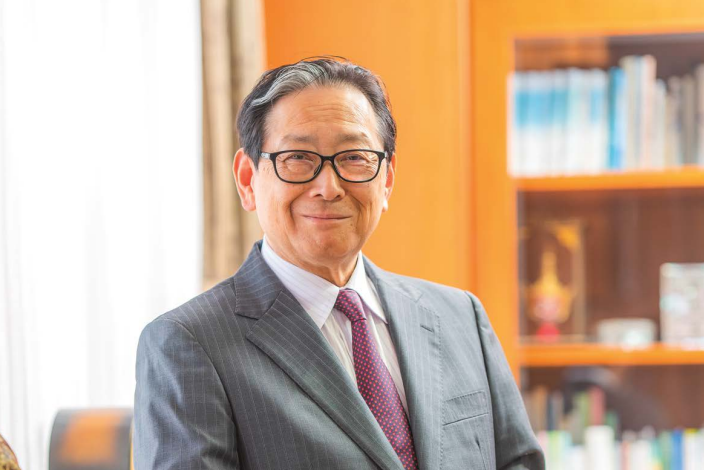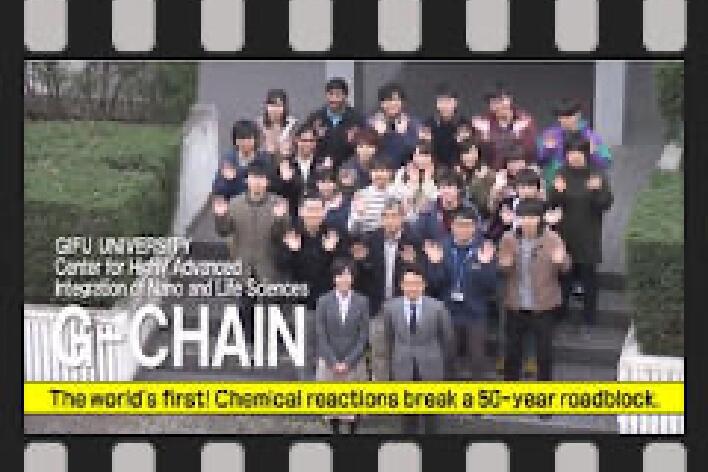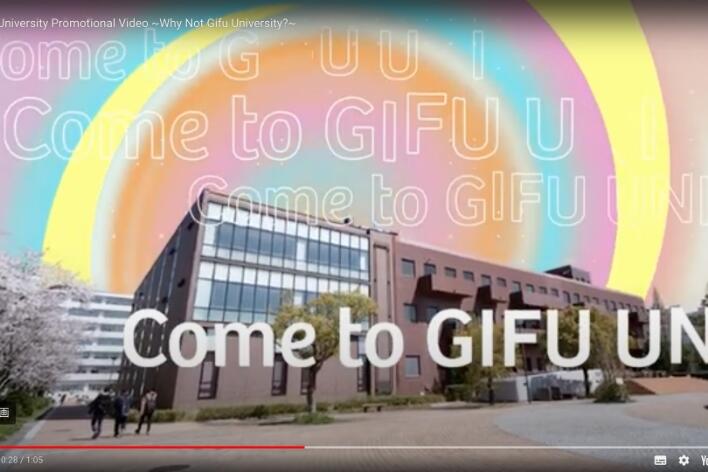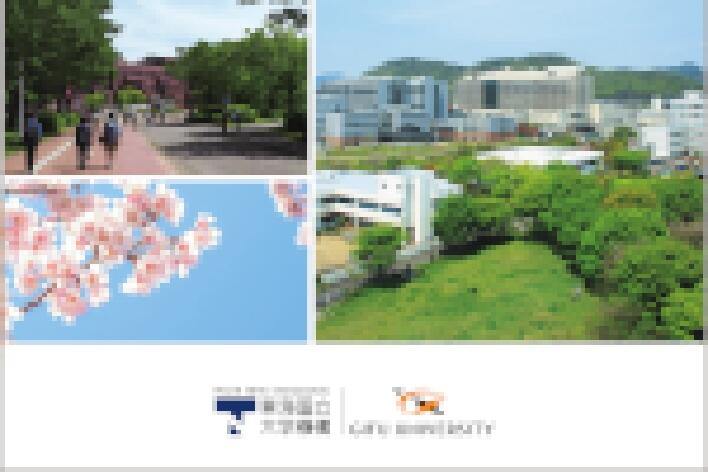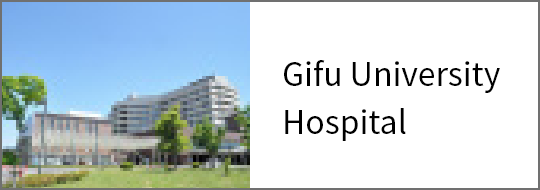LOCAL SDGs
*Information related to faculty members/students and graduate schools at Gifu University here are all that of the time of interviewing.

Our collaborative research project, titled the study on the Impact of Climate Change Adaptation of Forest, Village, and River in the Nagara River Basin on the Sustainability and Well-being of Livelihoods in the Mountainous Regions, involves collaboration between Gifu University, the Gifu Prefectural Research Institute for Forests, the Gifu Prefectural Research Institute for Fisheries and Aquatic Environments, and the National Institute for Environmental Studies. This comprehensive study addresses the multifaceted environmental challenges associated with climate change adaptation. It also explores connections to societal issues, such as declining birthrates, population aging, and regional disparities.
We present the perspectives and visions of our faculty members actively engaged in this ambitious endeavor.
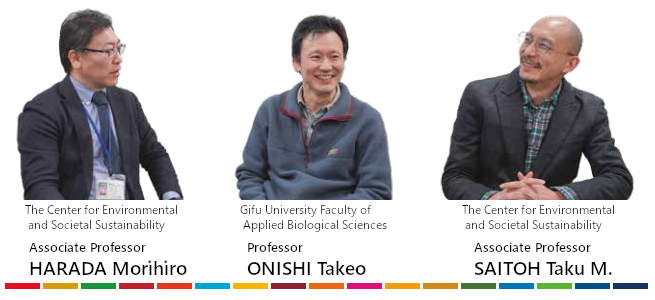
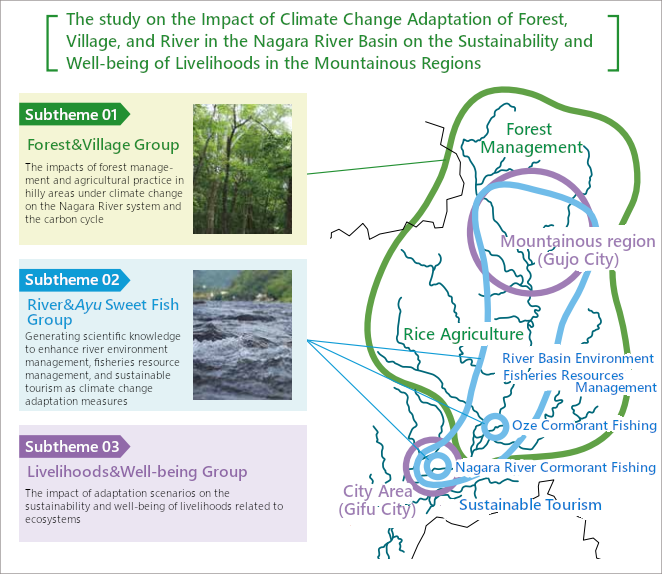

Researchers from diverse fields strive to localize environmental issues, establishing a foundation that encourages people to perceive them as relevant and familiar challenges, rather than viewing them solely on a global scale.
Understanding climate change impacts from a regional perspective is crucial for obtaining a comprehensive view
Climate change resulting from global warming poses serious challenges to all humankind. The average temperature in Japan has already risen by approximately 1.3℃ over the past century. In Gifu Prefecture, this increase has been even more pronounced, reaching about 1.8℃. Surprisingly, global warming in Gifu is more advanced than the national average. Just as climate change impacts vary between Japan and other countries, tailored mitigation and adaptation strategies are essential even within Japan to address local conditions.
In April 2020, the Gifu Prefectural Government and Gifu University jointly established the Gifu Prefecture Center for Climate Change Adaptation. Since then, we have actively engaged in collaborative research to define criteria and standards for implementing climate change adaptation measures from a scientific perspective. As part of the Research on Complex Effects of Climate Change on Water-Related Disasters, Agricultural Land, River Basin Ecosystems, and Industry, & Adaptation Measures, funded by the Comprehensive Fund for Promotion of Environmental Research of the Environmental Restoration and Conservation Agency from FY 2020 to FY 2022, researchers from various fields--including weather, water, forests, agriculture, forestry, fisheries, and social systems-- were brought together to explore this critical issue from diverse viewpoints. By elucidating the multifaceted effects of global warming, our goal is to establish a framework that facilitates collaborative study and implementation of adaptation measures with local governments and practitioners.
Through our research, it has become evident that the ayu sweet fish, a symbol of the Nagara River, is increasingly impacted by rising temperatures. Global warming is elevating river water temperatures. During the dry summer season, the water temperature in the section flowing through Gifu City exceeded 26℃--the upper limit suitable for ayu habitat. Consequently, the ayu has been shifting its habitat upstream to cooler waters. The spawning season in fall has been steadily pushed back, highlighting how global warming affects the entire life cycle of the ayu.
We have also discovered that relatively cool water from the Yoshida River, the Itadori River, and other tributaries in the north flowing into the Nagara River helps moderate the rising water temperature of the main river. In addition to collecting data, we conducted interviews with professional fishermen who work in the river. These fishermen have personally experienced the effects of recent global warming, but the impacts differ significantly between upstream and downstream areas. While they are familiar with their own fishing grounds, they lack knowledge about what is happening in other parts of the entire river basin.
We collected pertinent data and input from fishermen and other stakeholders across the entire river basin, analyzing them to assess the impacts of global warming.
During our field surveys, we discovered that the various data collected and accumulated by government agencies and research institutes are highly valuable for analyzing environmental changes, including climate and ecosystem. While each investigation and analysis are a gradual, step-by-step process, government-held data serves as essential analytical material, providing insights into the broader context of environmental changes around us. Additionally, openly sharing the results of these surveys and analyses is indispensable. When more stakeholders have a common understanding, they can collectively consider effective countermeasures from their unique viewpoints and take new steps forward.
Focusing on the Well-Being of Local Residents
Becoming an environmental science research hub that integrates the humanities and sciences
Building upon the findings from the three-year Research on Complex Effects of Climate Change on Water-Related Disasters, Agricultural Land, River Basin Ecosystems, and Industry, & Adaptation Measures, the project called the Impact of Climate Change Adaptation of Forest, Village, and River in the Nagara River Basin on the Sustainability and Well-being of Livelihoods in the Mountainous Regions was initiated in FY2023. By referring to existing knowledge and data on climate change adaptation, this project aims to develop more tangible adaptation strategies through collaboration involving government agencies, researchers, and local communities.
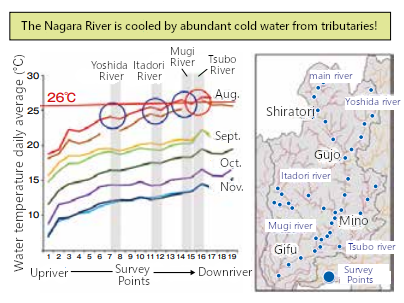
Effects of Climate Change on Water-Related Disasters, Agricultural Land, River
Basin Ecosystems, and Industry, & Adaptation Measures." It was found that the
rise in water temperature in the mainstream was mitigated by the inflow of cold
tributaries.
The project is being undertaken by three groups, the 'Forest & Village Group,' the 'River & Ayu Sweet Fish Group,' and the 'Livelihoods & Well-being Group,' each assigned to specific areas. The research on forests and villages is motivated by the fact the planted forests during the postwar period of afforestation expansion have now reached the stage where harvest is necessary. The decision lies between reforestation after logging or exploring alternative uses for the area given that forests, water, and rivers are intricately interconnected.
We are estimating the carbon sequestration under current and future climate condition by model simulation together with carbon cycle data at Japanese cedar forest at the Takayama Field Station, Gifu University and forest monitoring data offered by Gifu Prefecture and Gujo City.
We are also using the experiment forests of the Faculty of Applied Biological Sciences in Gero City, Gifu Prefecture to investigate forest types from a hydrological perspective. Hydrology deals with the water cycles of on Earth. For instance, we're exploring whether there are differences in flood mitigation and water source irrigation functions between areas planted with cedar and cypress trees versus secondary deciduous broadleaf forests. Specifically, we're examining groundwater temperature, water quality, and water quantity. There have been limited studies focusing on water temperature. We believe that conducting simulations on this issue could enable us to create a future forecasting model for the entire prefecture, based on certain assumptions.

Takayama Field Station, Gifu
University. Forest carbon
sequestration has been measured
for nearly 20 years.
Another notable aspect of this project is its dual focus on people's lives. We examine not only the natural science aspects but also consider the humanities and sociological perspectives. Our research began with the belief that even if effective countermeasures are developed, their implementation hinges on enhancing the well-being of local residents who will ultimately be responsible for them.
We are currently investigating how the richness of the natural environment and climate change impact people's livelihoods and their sense of spiritual and social fulfillment. For instance, some individuals have migrated from urban areas to the middle and upper reaches of the Nagara River, leading vibrant lives. However, others feel that their migration did not align with their original vision. Our ongoing research explores various hypotheses, including the idea that migrants' happiness correlates with their appreciation for nature's abundance and their connections within the local community.
We would like to engage in cross-disciplinary discussions with faculty members of the School of Social System Management, experts in this field of research and examination. Our goal is to develop research activities that resonate with the local community.
Given Gifu University's deep roots in the local community, I believe that the university, as an integral part of the local fabric, can establish sustainable cooperative relationships with local governments, affiliated institutions, businesses, and citizens. By taking advantage of these partnerships among stakeholders, we would like to showcase how researchers can actively address global environmental challenges associated with climate change and biodiversity, both within Japan and internationally, through our engagement in the region.
While global warming may sound like a large-scale agenda, it is crucial to bring the scale it down to the local level. By doing so, we can better understand the connections between local environmental and social challenges. We believe that the university's research endeavors will become a driving force for solving local environmental and social issues in the future.
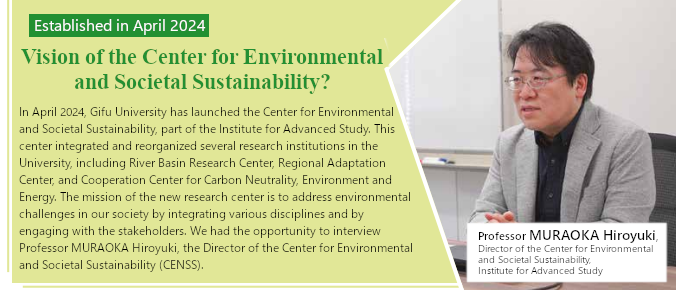
The global environmental change is proceeding, and we are challenged to address them in our daily lives in the society. CENSS provides stakeholders with comprehensive expertise and scientific knowledge necessary to tackle those environmental challenges. These challenges include mitigating global warming, adaptation to climate change, and ensuring sustainable use of ecosystem services, and co-creation of effective solutions.
Numerous researchers at the River Basin Research Center and other institutions have actively contributed to environmental research and human resource development so far in many academic ways. For example, those scientific activities accumulated knowledge on forest ecosystems and water resource management which are fundamental systems of our world.
However, there is a growing need to develop integrated studies by connecting from basic research on the natural environment and environmental resources to problem-solving research that offers practical solutions. This context underpins the establishment of CENSS.
While Japan's abundance of water, forests, and natural resources might make it seem less susceptible to global environmental issues, there are still critical challenges to address. These include changes in river ecosystems and forests' capacity to sequestrate carbon dioxide, and the impact of global warming on agricultural crops. To tackle these issues, we are developing a comprehensive diagnostic method for "river basin landscape"--systems where nature and society intersect closely. By discovering and analyzing data that reveals the connections between local communities and the environment, along with future projections of environmental effects, we collaborate with stakeholders to co-create sustainable society.
Our daily lives and economic activities rely on the integrity of natural ecosystems. To achieve a sustainable society, we must foster a co-development relationship between people and nature. We have encapsulated this idea in the name of our center, "Kyoseitai" (meaning "symbiosis" in English). Local environmental challenges are intertwined with social issues like population dynamics, the economy, and carbon neutrality.
To tackle these challenges, it is essential to collectively harmonize the wisdom developed in the university and promote comprehensive research that bridges the gap between different academic disciplines, i.e., we must transfer from multi-disciplinary to inter-disciplinary. To this end, the center has established four key research divisions: Environmental Resources Research, Environmental Change Adaptation Research, Social Systems Research, and the Carbon Neutrality, Environment, and Energy Research Collaboration Support Office.
Furthermore, we will collaborate with the Future Earth Research Center in Nagoya University to advance environmental initiatives within the Tokai National Higher Education and Research System. Our goal is to foster a diverse range of activities, including research, human resource development, social cooperation, and international collaboration, positioning the center as a knowledge hub in the field of environmental studies.
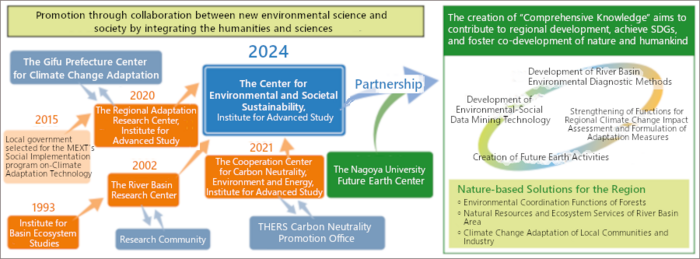
(Click to enlarge)

